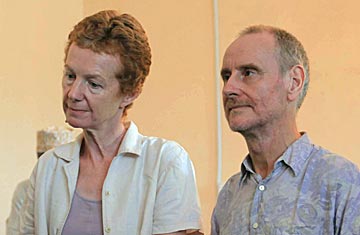
Released British hostages Rachel and Paul Chandler at the presidential palace in Somalia's capital, Mogadishu
Somali pirates released a British couple from captivity on Sunday, ending a yearlong drama in which the pair was moved, separated and moved several times again as negotiations to win their release stalled over the amount of ransom to be paid. The pirates turned Paul and Rachel Chandler over to local Somali authorities near the central town of Adado on Saturday. From there, they flew to the capital Mogadishu, where they met with officials from the Transitional Federal Government before leaving for Nairobi on Sunday night. "We're fine. We are rather skinny and bony, but we're fine," Paul Chandler told the BBC on Sunday. Official photographs released by the Somali government showed them smiling and looking healthy as they met with Prime Minister Mohamed Abdullahi Mohamed.
Throughout their ordeal, officials with Somalia's parliament and its Transitional Federal Government had said that the Chandlers would be released soon. The predictions stopped several months ago once it became clear that negotiations were dragging on. Indeed, the ransom appeared to have been coughed up twice. The pirates initially asked for several million dollars, but sources inside Somalia who were involved in the negotiations tell TIME that the final ransom total was about $750,000 — including an estimated $400,000 in June that was supposed to free them outright, followed by $350,000 in the past few days.
The Chandlers were nabbed in October 2009, during a postretirement, around-the-world sailing adventure that became part of the hijack-and-ransom nightmare in the pirate-filled waters off the Horn of Africa. Pirate sources tell TIME that the Chandlers were repeatedly moved and separated to avoid the threat of a government raid to free them. In May, Paul Chandler had told a Somali reporter who managed to reach him that their family should not lose hope that they would be freed. "We don't miss any thing. We miss everything," he told the reporter, who was working for a British TV network. "We miss the ability to walk out of the door and determine our own lives, wrongfully taken from us."
At one point, the pirates discussed selling them to al-Shabab, the hard-line Islamic militia group that controls much of southern Somalia. But then al-Shabab turned belligerent, and in May the pirates had to move the Chandlers because the Islamists had attacked a town called Haradhere, near where the couple were being held. A Somali pirate who identified himself as Qodar went on Somali radio in October to say that his cohorts were becoming impatient and angry about the cost of keeping the hostages, and that the Chandlers were living in far worse conditions than they had early in their captivity.
But the British government, as policy, refused to pay the ransom — even though shipping companies and other countries do. The Chandlers, however, did not have the wherewithal of corporations or governments. Before their retirement, she was an economist, he was a civil engineer. Their round-the-world trip was low-budget: the yacht itself was not terribly big, and they had sold their house to afford to make the trip. As the impasse continued, their relatives grew increasingly frustrated. Midway through the captivity, there were reports — later proven to be untrue — suggesting that Rachel had been shot. The relatives eventually got a court injunction in the U.K. against media coverage of the case because they believed it was stalling the process. In the end, the Chandlers' family hired a private hostage-negotiation team to conclude the deal with the pirates, sources who were involved in the discussions tell TIME.
The pirates, too, became angry after Somali elders tried to persuade them to release the Chandlers on humanitarian grounds because of their age — he is 60 and she is 57 — and because their health was reportedly deteriorating. "They were trying to convince us to free them without payment, but we would never agree on that point," Mohamed Yare, one of the pirates' negotiators, tells TIME. "Also, they tried to pay less, about $100,000. That was why it took so long to free Paul and Rachel."
On Sunday, after the Chandlers were released, the family would say little but that common sense had "finally prevailed." "The family believes it would be irresponsible to discuss any aspect of the release process as this could encourage others to capture private individuals and demand large ransom payments, something that we are sure none of us wants," the family said in a statement.
— With reporting by Reagan Dawale
